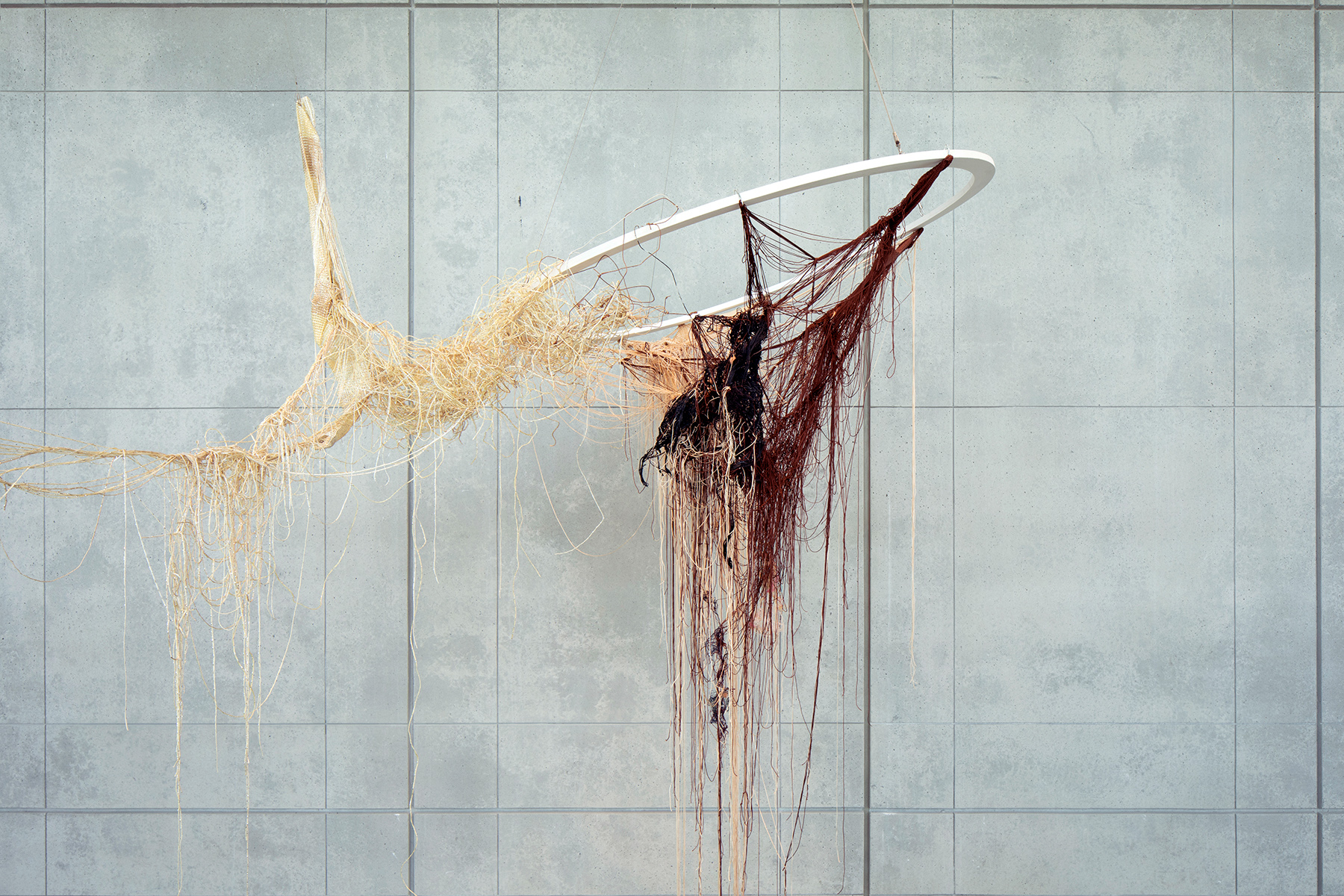Casey Kaplan


THE IMPORTANCE OF RITUAL: A CONVERSATION WITH IGSHAAN ADAMS
By Erin Jane Nelson
21 February 2020
Igshaan Adams’ (South African, born 1982) first solo museum exhibition in the United States is displayed in a gallery whose walls are built with historic Savannah Grey brick, a masonry style created by enslaved African Americans in the Antebellum South and recalls the region’s violent past. In “Getuie” (an Afrikaans word that translates into English as “witness”), Adams’ adorned tapestries, fabric wrapped sculptures, and the residue of past performances are displayed along a corridor of battered linoleum floors he sourced from the homes of working class, mixed race communities of his native Cape Town, South Africa. Both the artist and the floors have themselves witnessed the frenetic and violent reality of the racially oppressed communities that endured Apartheid and its residual cultural impacts. Though beautiful, rich, and deeply immersive, Adams’ exhibition comes from a difficult personal history and yearning to heal generational trauma. We spoke in Savannah shortly after the exhibition opened at the SCAD Museum of Art. This conversation has been edited for publication.
Erin Jane Nelson: You mentioned earlier that your mother and aunt helped bead some of your pieces in the exhibition. Do you collaborate with them regularly? How have they influenced your approach?
Igshaan Adams: My family in general has been such a strong influence or inspiration in many cases. As an artist, we all sit with these burning questions, the motivation to know the answer. I wanted to know certain things about myself and so I looked to my family.
I did a performance with my father where he washes and prepares my body as if I had died, which was about creating a moment for the two of us to kind of recenter our relationship; to forgive. Something died in that process, perhaps the younger version of myself that needed to fix the relationship with my father, because I saw him as the monster. He was a drug addict; he was violent. I witnessed my mom being brutally beaten on a daily basis by him. So, I hated him in a sense and I hated myself for being a part of him, coming from him. I knew if I was ever going to have a healthy life, that I needed to fix that. So this performance became that moment of killing the part of me that hated him and opening up a space where we could then renegotiate the relationship and become father and son again, which has happened. We have a fantastic relationship now and it has been good for a long time.
I guess I learned in that process the importance of ritual. So, I created other performances. It works and I wanted to do it again. So, I also did one with my brother. You will see the residue of that performance with my brother in this exhibition with the stool and the bowl. I simply asked my brother to wash my feet and I washed his and again, it was a moment where we could genuinely humble ourselves in front of the other and wash clean the past and what had gone wrong in some points and start fresh. Again, so effective. There’s something about ritual that, as human beings, it just cuts through the bullshit immediately.
EJN: Do you feel like using ritual is a continuation of a religious practice or do you feel like your religious identity is part of your approach to work?
IA: Yeah. It’s changed over time for sure–it’s a little bit complex. So, I was born Muslim and my father was born Muslim, but my mom was born Christian and she converted at a young age. She really loved Islam and she really put in the effort to understand the religion in her younger years. Ultimately, the abuse really got to her.
EJN: That would shake anyone.
IA: Yeah, 25 years of physical abuse changes you dramatically. So, the religious identity became complex. My maternal grandmother took on the responsibility of raising us when I was five years old because, you know my parents weren’t really responsible. My mother then also became an alcoholic and my father too. They moved away when we were five years old and they moved to a much more dangerous part of the community, the Cape Flats area of Cape Town.
My grandmother was Christian, and a very staunchly religious Christian woman, though I think she loved Islam. She really respected the discipline she saw in other Muslims and she wanted to give us an Islamic education. So she invited an Imam into our home to teach us the Quran and the things about Islam that she couldn’t. She would fast with us during Ramadan because we were kids and there was no one else who could fast with us. But, she still maintained her own religious identity.
Read the full interview HERE